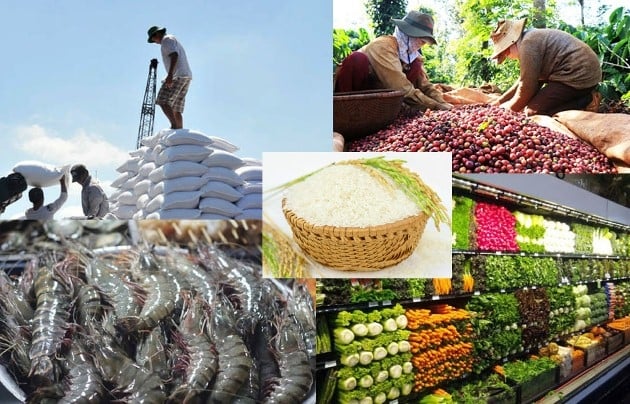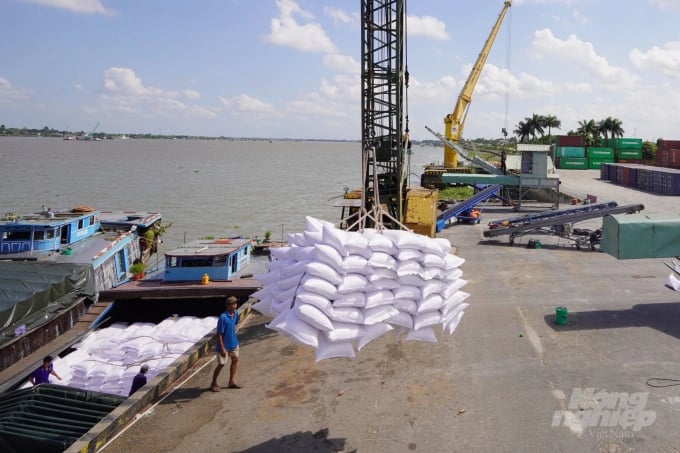November 26, 2025 | 03:28 GMT +7
November 26, 2025 | 03:28 GMT +7
Hotline: 0913.378.918
November 26, 2025 | 03:28 GMT +7
Hotline: 0913.378.918
The EU-Vietnam Free Trade Agreement (EVFTA) was discussed during the recent Vietnam-EU agricultural business forum in Hanoi.
EVFTA, as one of the new generation of free trade agreements, has ushered in a new age of trade exchange between Vietnam and the EU by reducing tariff barriers and establishing bilateral markets. After 10 years of implementation, EVFTA will contribute to the elimination of roughly 99 percent of tariff lines for Vietnamese exports to the EU.
Immediately after the EVFTA went into force, the EU guaranteed zero tariffs on 47 lines of fresh and processed vegetable goods, which represent Vietnam's export strength. In addition, the EVFTA eliminates certain trade obstacles for Vietnam and assists the country in meeting international standards in terms of its legal structure, environmental laws, and investment criteria.
According to Jean Jacques Bouflet, vice president of the European Chamber of Commerce (EuroCham), EU investors see the EVFTA favorably. In accordance with a survey conducted by EuroCham and VCCI in the second quarter of 2022, the proportion of EU companies profiting from doing business in Vietnam rose from 5 percent in the fourth quarter of 2021 to 8 percent in the second quarter of 2022.

Rice, coffee, seafood (pangasius), and vegetables (fresh, processed) are Vietnam's main products exported to the EU. Illustrative photo.
The Ministry of Industry and Trade's data revealed that exports from Vietnam to the EU surged by 40 percent in 2021, reaching USD 45 billion despite the pandemic. EU becomes one of Vietnam's main export markets, accounting for 30.7% of total export turnover with important items like coffee, cashews, pepper, vegetables, and rice, among others.
Mr. Ngo Chung Khanh, Deputy Director of the Department of Multilateral Trade Policy (Ministry of Industry and Trade), said during the session that Vietnam is in its second year of EVFTA implementation. In the near future, Vietnam's key exports, such as rice, coffee, seafood (catfish), and fresh and processed vegetables, will be brought to the European market with a tax rate as low as zero, creating enormous prospects for businesses producing and processing these commodities in Vietnam.
The market share of Vietnam's coffee, vegetables, and seafood items on the European market is rather limited, but with the tax commitment from the EVFTA, Vietnam may take advantage of the chance to extend its market share and increase its presence in this region.
The EU is the third biggest agricultural export market for Vietnam, with an annual turnover of around USD 5.5 billion, or 15 percent of the overall export value of agricultural goods.

According to a survey by VCCI, only 10% of Vietnamese enterprises understand the EVFTA well. Photo: Tran Trung.
In 2021, the whole value of Vietnam's agricultural exports to the EU accounted for just 4% of this market's total import turnover of agricultural items. This percentage demonstrates that the export volume of Vietnam's agricultural goods to the EU is still low relative to Vietnam's export potential and EU import demand.
According to Khanh, if Vietnam does not take advantage of the time to utilize the EVFTA, it would regret it since it may face more competition in the future from nations in the area that can sell commodities-equivalent items to the EU market.
The EU is a market with stringent and stringent animal and plant quarantine standards. To boost the position and reputation of Vietnamese agricultural goods in this market, firms must increase the quality of their products and comply completely with EU regulations and standards.
In addition, it is vital to increase product quality, price, and sustainable development factors, since EU consumers are becoming increasingly concerned in how products are made to fulfill the environment-friendly or worker rights protection.
According to a VCCI survey, barely ten percent of Vietnamese businesses have a thorough understanding of the EVFTA. Consequently, up to 90% of Vietnamese businesses do not understand or fully understand this bilateral trade agreement. This may be a barrier preventing Vietnamese businesses from maximizing prospects in the EU market.
Mr. Jean-Jacques Bouflet agreed with the VCCI representative that Vietnam's agricultural exports to the EU confront several hurdles, including EU standards. Potential product groupings such as vegetables, rice, and instant foods have not yet reached the output level demanded by the largest European supermarket chains.
In light of the EU's rising demands, the availability of raw vegetables and fruits that fulfill EU export regulations remains constrained. Because of this, European companies have not yet shifted to importing fresh fruits and vegetables from Vietnam.
In the meanwhile, the EU continually updates and distributes information regarding Sanitary and Phytosanitary Standards indicators for imported agricultural goods, as well as enhances certification requirements relating to environmental protection and sustainable social development.
Translated by Dieu Linh

(VAN) Deputy Minister Nguyen Quoc Tri emphasized the determination to prevent violations at CoP20, sharing enforcement results and commitments to strengthen cooperation with the international community in the coming period.

(VAN) In addition to strengthening the relationship between schools and enterprises, the Aus4Skills project expands opportunities for female students and people with disabilities to work in the transport and logistics sector.

(VAN) Nghe An is preparing policy, technical, and resource steps to participate in the forest carbon credit market.
/2025/11/25/1648-2-110733_532.jpg)
(VAN) From 2011 to 2023, Ca Mau province lost approximately 6,200 ha of coastal land and protection forests due to erosion, threatening many residential areas, infrastructure facilities, and production zones.

(VAN) Quang Ngai holds strong potential for carbon credits but needs a clear legal and policy framework to secure sustainable revenue from this resource.

(VAN) With its diverse ecosystem, Phu Quoc National Park plays a vital role in environmental protection and biodiversity conservation and serves as the core zone of the Kien Giang World Biosphere Reserve.

(VAN) Cooperation activities under the Aus4Skills program focus on: logistics professional development, competency-based training and assessment (CBTA), leadership innovation, and digitalization.